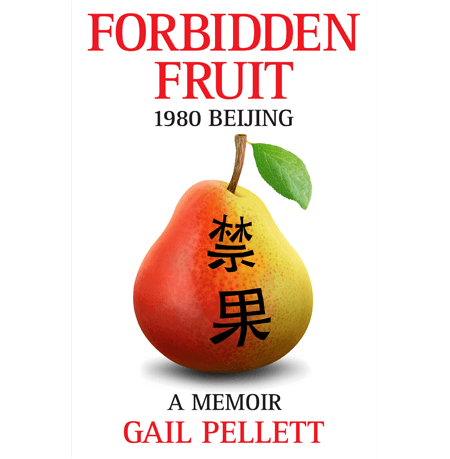About the author
 Gail Pellett is a writer, director, and producer of award-winning TV and radio documentaries. Her work has appeared on PBS, NPR, NBC, CBC and Pacifica Radio. Her articles have appeared in the Washington Post Magazine, Mother Jones and the Village Voice, as well as webzines.
Gail Pellett is a writer, director, and producer of award-winning TV and radio documentaries. Her work has appeared on PBS, NPR, NBC, CBC and Pacifica Radio. Her articles have appeared in the Washington Post Magazine, Mother Jones and the Village Voice, as well as webzines.
About the Book
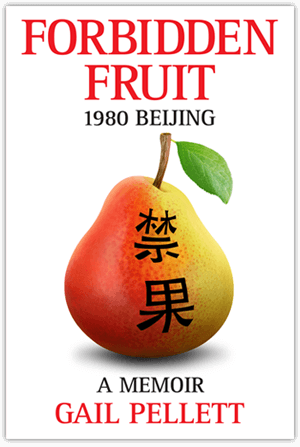
In 1980, Gail Pellett, a producer for radio and TV, moved from New York to Beijing to work as a “foreign expert” at Radio Beijing, China’s equivalent to the Voice of America. Invited for her expertise and American-Canadian perspective, she was then treated as a Western spy. Chinese colleagues, acquaintances and, most painfully, lovers were warned away.
During a pivotal moment in post Cultural Revolution China when windows were being thrown open – and then, slammed shut — this story records Pellett’s journey from hope, naivete and ignorance through profound disillusionment and emotional pain to enlightenment in her efforts to taste Mao’s forbidden fruit.
TITLE: Forbidden Fruit — 1980 Beijing, a Memoir
ISBN: 1-934395-59-5
AUTHOR: Gail Pellett
PUBLISHER: VanDam Publishing, Inc.
PRICE: $18.95 US
PAGES: 400 pp. plus color photos
FORMAT: 6” x 9” paperback
CONTACT: info@vandam.com
Reviews & Media

Bill Moyers, broadcast journalist and author
All good journalists travel in multiple time zones: the present, the past, and the future, enabling readers to share a textured experience as history, politics, and culture create a vortex of change. My gifted colleague, Gail Pellett, who arrived in Beijing in l980, becomes witness to history’s turning. And she fortunately possessed the sensuous antennae to capture the emotional truth within the discernible reality. She has written a riveting tale of a woman’s adventure in pursuit of exotic forbidden fruit.

Barbara Ehrenreich, author, Nickel and Dimed, and other books
Both as history as well as deeply intimate and crisply reported memoir, Forbidden Fruit is a fascinating read, rich with romance and charged with suspense.

Shawn Wong, author and Professor of English, University of Washington
... a compelling story about identity, citizenship, nation, and a personal path of love, heartbreak and loss. We are reminded with every turn of the page about the lives of people trying to negotiate the public and private versions of their hearts and minds.

Linda Gordon, author and Professor of Humanities, NYU
This gripping story is much more than a memoir of a uniquely brave, adventurous feminist woman journalist and filmmaker. It also brings to life much of the culture of post-Cultural Revolution China. On the level of Pellett’s films -- a high standard.

Claudio Lomnitz, author and columnist for La Jornada (Mexico City) and Professor of Anthropology at Columbia University.
Following Mao's dictum, "If you want to taste a pear, you must change the pear by eating it," Pellett renounced a tenure track job at Rutgers to work at Radio Beijing. She could be sighted criss-crossing Beijing on her "Shanghai Phoenix" bike, with red boots, purple pants and her mop of red hair. The Gang of Four were docked for trial. The truth about the atrocities of the Cultural Revolution were starting to trickle out... Pellett has crafted a uniquely brave memoir proving that the personal is political.

Kirkus Review
"As a hard-drinking, single, Western woman of 37 with red hair, lusty appetites, a stack of blues and jazz cassettes, and a propensity for asking leading questions, she attracted rabid attention...Pellett provides a marvelously deft view of street life in Beijing and other parts of China during the time...A highly engaging...story of a Chinese journey that's worth telling." Read Review

Lisa Brackmann, LA Review of Books
"...Forbidden Fruit captures a specific, peculiar moment in time and place, what it was like to be a foreigner in Beijing at the beginning of Deng's reform era, as well or better than any book I've read. Forbidden Fruit reminded me, too, that in spite of the obstacles, it was possible at times to connect." Read Review

Ellen Tolmie, rabble.ca
"The memoir's deepest reward(s) are its excavation of China's revolutionary process...and the assumptions, illusions and merits of Pellett's own political formation..(along with) the rich description of China...and her persistent efforts at connection." Read Review

Portland Review of Books
"Gail Pellett's new book Forbidden Fruit – 1980 Beijing, a Memoir is a captivating read and an window into a time and place that few people were privileged to explore." Read Review

Karen Chutsky, Midwest Review of Books & Independent Publishers
"ballsy, informative...vibrant, passionate...raw diary of her experiences mouthed with her plucky, expressive style, punctuated with shards of Jazz and Blues commentary..." Read Review
Samples from the book
Contents
Prologue 1
Chapter 1: Somewhere Else 5
Chapter 2: The View From My Window 21
Chapter 3: My Shanghai Phoenix 35
Chapter 4: Who’s Out There? 45
Chapter 5: We Have Friends All Over the World 65
Chapter 6: Stranger in a Strange Land 93
Chapter 7: The Comrades and Mao’s Pear 127
Chapter 8: Journalists, Missionaries and Spies 157
Chapter 9: You Are My Chairman 183
Chapter 10: A Hundred Flowers—Blooming and Scorched 209
Chapter 11: Little Miss Cultural Imperialist 223
Chapter 12: Dreaming of Sugar Plums While Deng Lays Down a New Line 243
Chapter 13: Solitary Walker 271
Chapter 14: Microphone Dream 291
Chapter 15: Honoring the Ancestors 317
Chapter 16: At Last 341
Epilogue 369
Acknowledgements 379
Bibliography – Books 383
Bibliography – Music 386
Prologue
Tears froze on my cheeks as Gobi Desert winds hurled a mix of grit and coal dust, like tiny shards of glass, into my eyes. A cotton face mask prevented me from gulping in the mix. I could barely feel my feet pumping on my one-speed Shanghai Phoenix. Few bicyclists were on the streets at this hour. An occasional Soviet-era Volga passed as I pedaled from pool to pool of street light.
It was a strain to push on in my bundle of clothing—blue jeans underneath my baggy People’s Liberation Army pants, then three layers of sweaters under my black cotton padded jacket with the stand-up collar. “That’s what old men wear,” the comrades told me at the office. I found the long PLA padded coats too cumbersome for bicycling. In this numbing, life-sucking, bitter wind, I conceded to the padded Army hat with the ear flaps. Only my eyes would reveal the truth. That I was a waiguoren—a foreigner, outsider. In the dark on this withering night, I doubted whether anyone could see my Western boots. Or my starved libido.
The excitement of a forbidden invitation to a local guy’s apartment was pulsing adrenalin through my veins and resurrecting my torpid mojo, despite the plunging temperatures and seven kilometers to his building. Whether from the exertion of bicycling in all this padding or the anticipation of going to an illicit rendezvous, I could feel the moisture forming between my breasts. I visualized steam underneath my sweaters and pants.
Ming had instructed me to wear the local uniform. I had been hanging onto my New York wardrobe to bolster my identity crisis here, but this time I did not resist the pressure to conform. And although he had looked doubtful about my navigational skills when he pointed out his street corner on my Beijing map, it was along one of my regular bike routes and was by now a deeply grooved mental map directing my legs to overcome isolation, loneliness and despair.
I had been in Beijing for four months and had already learned sad and frustrating lessons about the bizarre policy that separated foreigners from the Chinese. And the surveillance and fear that made it work. There could be serious consequences for fraternizing with a native. The Chinese could lose the most. Jobs, housing and worse. If they were suspected of discussing state secrets—who knew what they were—they could go to jail.
And even though I had been invited to work as a “foreign expert” at Central Broadcasting precisely for my broadcast journalism skills, the fact that I was a journalist had sent out huge warning flares to all the Chinese around me. It was as if I had a tattoo in psychedelic paint spelling “SPY” across my forehead. I felt as if I were radioactive. I could be arrested and deported if the government intelligence gatherers—who were everywhere—discovered I was meeting secretly with a Chinese man. Already other Chinese acquaintances had been warned away from me.
I had met Ming in unusual circumstances, far away from the Party informants among my comrades at Radio Beijing and the spying eyes and ears at the building where I lived. When he invited me to visit his apartment, I was stunned. First, because it meant defying a potent government policy, but also, because of the housing crisis, I was puzzled how a young single man—a student—could procure an apartment for himself. Throughout the city several generations were crammed into one and two rooms with shared kitchens and bathrooms. Even young married couples sometimes had to live separately— with parents or in singles’ dorms. How did Ming pull off his own apartment? He had to be part of that maligned category that the comrades referred to while frowning—the spoiled sons of high cadres. That, too, aroused me.
I knew my attraction to Ming was superficial. Since we didn’t share a language, we acted out all of our conversations in childish charades and furious dictionary consultations. But his kinetic humor broke through the dirty screen doors of the language barrier. He also had a seductive face, round with full lips and mischievous eyes. Even if he were ten years younger, how could I resist this opportunity? I was ecstatic. At the corner, hunched against the wind, buried in layers of army garb, he was waiting.
Ming seemed both nervous and pleased that I was decked out in Chinese drag. Not a stray long, curly red hair leaked from underneath my hat. Surely I could get away with passing a neighbor or two at the entrance to his building. But then, while biting his lip, he motioned me to the back of his building. We were plunged into darkness. Looking in all directions, he then checked to see if the fire escape was clear and motioned me ahead.
Was I making a horrible mistake? Would he rob me? Imprison me? Or worse? I tamped down those thoughts. We crept up the unlit stairway, a hazardous course, since tenants had tied their bicycles to the railings and stored stuff on the landings. When we reached the fourth floor, he waved his arms “no” in front of the entrance, later explaining that he shared a kitchen in the hall with another family. He then beckoned me to follow him—through the window off the stairwell.
Was I crazy? At the age of thirty-seven, I was sneaking into the apartment of a much younger guy in Beijing through the window? Was this a blinking neon sign of how far I had regressed here?
“Zou ba!” Let’s go! he said. An avalanche of fear flooded my serpent brain. Was he going to turn out to be a rapist or ax murderer? Would I disappear? My body parts found years later? That panic fused with the thrill of attempting something profoundly illegal.
Bicycling to Ming’s apartment in this brutal weather, padded in PLA layers, sneaking up the fire escape, crawling through a fourth floor window, I felt like I was about to score some drugs. Contraband.
And then, yes, then, it felt quite natural. Of course. How else could we do this? An older Western woman visiting a much younger Chinese guy. How else but through a window?
As I plunged headfirst through that window, I realized I would have to exit through that window, too. Only later would I understand this wickedly naughty act as a search for transcendence of all that was denied here. Free association. Critical thoughts. Lascivious thoughts. The sensual. Desire. Passion.
Pitching through that window became a metaphor for my belief that it might be possible to make a deep connection with the forbidden, with the radical Other. We might find we had something in common. Lust? Was that finally what enlightenment about the Other meant? Was that too personal, too selfish a need? Was I evading the more profound question of whether we could truly understand another culture? Another history? Perhaps, too, I was simply determined to be free. After all, the personal is political.
* * *
Chapter 3: My Shanghai Phoenix
Excerpt from Chapter 3:
August 14, 1980, Journal:
I cause a sensation everywhere. With so few foreigners here—especially Westerners—a redheaded Caucasian woman wearing purple pants and a lime colored T-shirt must be a freak show. Everywhere I bicycle, people stop, jaws drop. If I hesitate to look at something, a crowd of at least twenty surround me and stare. They push in close, look me over, carefully. My shoes are always the real object of curiosity. Today my Keds sneakers were being thoroughly examined. Claustrophobic. Unnerving. I, the only child, who loves being the center of attention, wanted to flee.
My clothes already feel ridiculous, but I’m hanging on for a few weeks yet. I am ruminating about my New York City wardrobe hauled to Beijing. What was I imagining? An expat life in 1930s Shanghai? Where will I wear all my 1940s vintage dresses and jackets? My high heels? Between my hair and bright colors, I have already caused accidents—men bicycle into the backs of trucks while staring at me. That’s why I started bicycling at night.
Chapter 5: We Have Friends All Over the World
Excerpt from Chapter 5:
One night , a new face appeared at my apartment door, which I had left open to create a breeze.
“Excuse me…hello…”
I turned down Miles Davis’ ’Round About Midnight playing on my cassette deck.
“Where do you get laid around here?”
Now, I cannot remember whether I let out a laughing yelp or simply stood there looking stunned. I was working on a charcoal drawing. I wiped the black dust from my hands and ushered this stranger in.
“Hi. I’m Luisa.” The husky voice plunked her abundant body into one of my plastic brown armchairs.I fetched a couple of glasses and poured Luisa some Chinese rum.
“I just arrived to work in the Spanish section.”
To my automatic questions she replied with a smoky accent, “I’m Argentine. Jewish. And a poet,” as if somehow this identity would explain why she was this far from home. “It’s my first day,” she continued, “and it looks desperate. What do you do? I mean, what do you do for fun? For your soul?”
I waved my arms around the room. I had only been in Beijing for six weeks and every inch of wall space in my two rooms was covered with drawings of Beijing street scenes. The loads people pumped around on those three-wheeled bikes; the way backs curved or hunched over handlebars; portraits of people squatting at the curb or stretched out, snoozing on the clay boulevard midday; the chiaroscuro in the narrow alleys and doorways that led into the enigmatic world of the Chinese—the world from which I was excluded. My drawings had absorbed a lot of my spiritual energy—or was it libidinal?
I avoided Luisa’s questions and ran down the routine in the building: how to get yogurt, milk and eggs from the kitchen, how to avoid eating in the dining room unless you liked lots of oil and overdone meat. “A couple of the hotels have restaurants offering different cuisines. There’s Pakistani food at the Qingqiao.”
She stared at her drink.
“There’s a Sunday morning bus trip to the Friendship Store. Friday nights they organize a bus to take us to movies at the Friendship Hotel…”
Her eyes studied my walls.
“Look,” I said, “the real story here is the segregation between foreigners and the Chinese.” Now my eyes were drifting. To a drawing of one of Beijing’s eight-foot walls—those walls had become a metaphor for the alienation I was feeling.
Luisa seemed interested only in some privacy and men. I wondered why she chose China. Between sips of rum she told me about her adventurous past.Leaving Argentina during the “dirty war.” Love affairs in Spain. Work in Japan where the misogyny was so great that they wouldn’t give her birth control pills. Something was missing because this woman was adrift on the planet. But the rum was blurring rational thought. Here, where my synapses were in overdrive with fresh sensations, the wrestling match with a strange language and the nightly cramming of Chinese history, I was having difficulty retrieving details about Argentina’s “dirty war.” I kept listening.
Luisa was provocative, energetic and romantic. Another passionate woman in China. I recognized more than a little of myself in Luisa. Spontaneity and intensity combined with lunacy—and vulnerability. In New York I would have embraced her, encouraged her friendship, played off of her childlike
emotions. But here, now, I was uncomfortable with her. I wanted to cover her up, shut her out. I was saddened by her, afraid for her. Listening to her open and raw sensuality, I realized that I had already begun to construct a carapace to protect myself.
Luisa’s opening question, “Where do you get laid around here?” had shocked me. I had never heard a woman pose that query in exactly those words before, despite my generation’s sexual revolution and my so-called liberated past. Perhaps she would never pose it in her native language. Sometimes we
can blurt things in another idiom that would never feel appropriate in our first and most intimate, nuanced language. But I admired her for it. It was so wild for China and cut straight to the heart of what ailed so many foreigners—and maybe the Chinese for that matter—that I should have laughed hysterically and held her close. I regretted not exploring her past more, but her interests
eluded me, and I was already embarking on a tortured soul journey trying to breach that wall to the Chinese. I had not come all this way to invest enormous emotional energies in foreigners, Westerners—even passionate refugees like Luisa.
Within a week, Luisa moved to the Friendship Hotel, “where the action is.”
There were several ghettos for foreigners living in Beijing. Diplomats,journalists and UN types lived together in a luxurious series of high-rise prisons just east of Wangfujing Street and the Beijing Hotel. A few foreign experts,like me, lived at apartment complexes attached to our work units. But mostforeign teachers and language polishers hired by the Chinese government,in this one-company country, lived in the giant Friendship Hotel on the far western edge of town.
Youyi Binguan, as the Chinese called the Friendship Hotel, was built during the ’50s for the Soviets. When they left, foreign workers from other countries moved in. Behind the walls of this complex, you could find everything from a health clinic to a beauty salon. It was all there. And it was pretty. Trees, grass, rock garden. But it was still an outpatient prison.
It began at the gate attended by at least one rifle-bearing PLA soldier who made sure no Chinese passed without first registering at the guard hut,filling out a form with name and, especially important, work unit—danwei—because their danwei leaders would be informed of their presence at the guard hut. The Friendship Hotel resident then had to be called to come and fetch the visitor—sometimes a walk of several blocks.
Each apartment building within the grounds also had twenty-four hour attendants on duty who made it a point to record and watch all who entered and exited. They could also enter any apartment at any time without knocking.
Since a copy of the form that a visitor signed to enter was also handed back at the gate when leaving, the guards knew how long visitors stayed. It was a law that any Chinese visitor could not stay beyond 11:00 p.m.
At the foreign experts’ building where I lived—that I now called by its Chinese name, Zhuanja lou (pronounced “juanja low”)—security was even tighter. Foreigners as well as Chinese had to fill in a lengthy form at the gate explaining their relationship to the resident they were visiting, and parcels were inspected. At night, if I returned home by taxi, the PLA soldier would leap out of his box and block the car, pointing his rifle at us. Faces in the car were searched, so usually I would get out of the car there and walk the rest of the way to the entrance, or everyone would have to fill in a form, even if they were only going to drop me off.
This segregation between the Chinese and me did not come as a total surprise. But nothing could have prepared me for the emotional trauma of living with the surveillance, mistrust and fear that reinforced it.
…
Choose a chapter
-
Contents
-
Prologue
-
Chapter 3: My Shanghai Phoenix
-
Chapter 5: We Have Friends All Over the World
Blog

Young Lives in China – review of Alec Ash’s “Wish Lanterns”
Originally published in LA Review of Books: Dec. 2, 2016 https://lareviewofbooks.org/article/young-lives-new-china/#! AMERICANS ARE OFTEN highly opinionated about China, yet reveal an embarrassing ignorance about the Chinese. Alec Ash’s new book Wish Lanterns: Young Lives in New China is the antidote […]
Continue Reading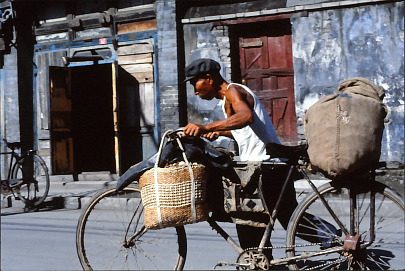
China’s Forbidden History, Subjects, Ideas
Along with the jaw-dropping economic and technological transformation in China over the past two decades, has come an Orwellian load of forbidden history, subjects and ideas. Aided by a Party-censored and self-censored traditional and social media these forbiddens are maintained […]
Continue Reading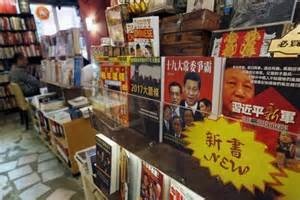
The Big Chill—Missing Hong Kong Publishers
January 24, 2016 There’s a big chill moving through Hong Kong as publishers are reported missing. On October 7, last year, Gui Minhai went missing from his Thai resort house, his daily medications that he was sorting left on the […]
Continue Reading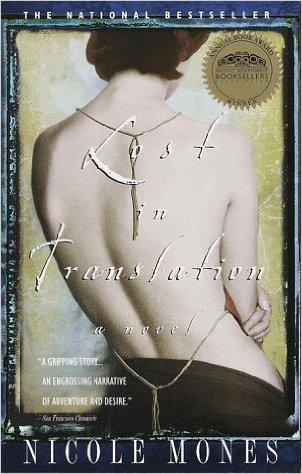
Nicole Mones: Desire, identity and love
Reading and writing interweave like lovers in a small bed. While working on Forbidden Fruit – 1980 Beijing, a Memoir friends often asked, Are you reading everything on China? The answer often surprised them. No. Since I was trying to […]
Continue Reading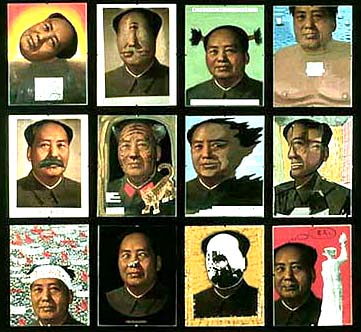
Zhang Hongtu – A Retrospective at The Queens Museum
It takes a long time to find your way in a radically different culture, language and place. It takes humility and fortitude to figure out where you are and whether who you are will survive the disruption of transplanting. It […]
Continue Reading
News / Events

Radio Interview – Gail Pellett on Forbidden Fruit—1980 Beijing
This week on Catskill Review of Books, Friday 27 Jan, at 15:30 on WJFF FM 90.5 and podcast on WJFFradio.org, Gail Pellett, on her book Forbidden Fruit – 1980 Beijing, A Memoir http://amzn.to/2kxUCmu On Soundcloud at https://soundcloud.com/catskill-review/gail-pellett On Audioport at http://audioport.org/index.php?op=program-info&program_id=112619&nav=& And on dropbox at https://www.dropbox.com/s/hazhgbyh4w9f5a5/Gail%20%20Pellett.mp3?dl=0 http://syndicatednews.net KPVL 89.1 FM Every Monday 1200 noon Iowa WGXC 90.7-FM Wednesday 3 pm NY WTJU, 91.1 Central Virginia, Friday 5:30 am WAZU 90.7 Thursdays 2 pm Illinois WRFI 88.1 Friday 5 am […]
Continue Reading
Forbidden Fruit—1980 Beijing, talk at Columbia University, Nov. 9
I will be talking about: Forbidden Fruit—1980 Beijing, a Memoir on Wednesday, Nov. 9 at noon til 1:30 pm at International Affairs Bldg 1AB, Room 501B (118th St. & Amsterdam Av). NYC. Event sponsored by the Technology, Media & Advocacy Concentration of the School of International and Public Affairs at Columbia University.
Continue ReadingForbidden Fruit reviewed in Midwest Review of Books
A review of Forbidden Fruit—1980 Beijing came as total surprise…August 16, 2016
Continue Reading“Dancing in Beijing” Review of “Forbidden Fruit” LA Review of Books
“…Forbidden Fruit captures a specific, peculiar moment in time and place, what it was like to be a foreigner in Beijing at the beginning of Deng’s reform era, as well or better than any book I’ve read. Forbidden Fruit reminded me, too, that in spite of the obstacles, it was possible at times to connect.”
Continue ReadingForbidden Fruit at Books Inc. Palo Alto, CA
Lively and engaged audience for Forbidden Fruit—1980 Beijing, at Books Inc. in Palo Alto, CA: Beijingers, ex-pats, scholars, writers & readers. Books Inc. is surviving with a beautiful extensive selection when other bookstores are wobbling and contracting.
Continue Reading
About the Book

In 1980, Gail Pellett, a producer for radio and TV, moved from New York to Beijing to work as a “foreign expert” at Radio Beijing, China’s equivalent to the Voice of America. Invited for her expertise and American-Canadian perspective, she was then treated as a Western spy. Chinese colleagues, acquaintances and, most painfully, lovers were warned away.
During a pivotal moment in post Cultural Revolution China when windows were being thrown open – and then, slammed shut — this story records Pellett’s journey from hope, naivete and ignorance through profound disillusionment and emotional pain to enlightenment in her efforts to taste Mao’s forbidden fruit.
TITLE: Forbidden Fruit — 1980 Beijing, a Memoir
ISBN: 1-934395-59-5
AUTHOR: Gail Pellett
PUBLISHER: VanDam Publishing, Inc.
PRICE: $18.95 US
PAGES: 400 pp. plus color photos
FORMAT: 6” x 9” paperback
CONTACT: info@vandam.com

